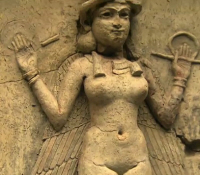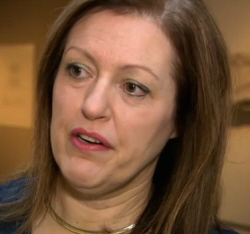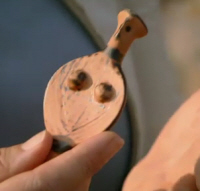Gaia Creator of the Gods
But the domination of Kybele and other powerful goddesses like her wouldn’t go unchallenged. The goddess would have to deal with a new pretender to the throne. He was a belligerent boy, spoiling for a fight. A boy who would be King.

Greek Poet Hesiod
I’m going to the country we think of as the birthplace of Western civilisation to see that titanic struggle played out in myth and in stone. The Greeks worshipped one of the most powerful goddesses of all time. In the eighth century BC, Hesiod, the celebrated Greek poet, recorded the epic story of the birth of the universe. At its heart was a claim of goddess Gaia. Hesiod described the creation of the world out of a kind of primordial chaos. And Gaia was there right from the start. In the beginning there was only chaos, the abyss. But then Gaia the beautiful rose up. Her broad bosom the firm foundation of all.
And fair Gaia first bore starry heaven itself to cover her on all sides and it be a home for ever for the blessed gods. And then she created the mountains. And then the barren, raging sea.

Gaia also creates the gods themselves. But within a generation, a divine war of the sexes is raging. For 10 long years, a series of epic battles is waged between three generations of gods and goddesses, all vying for supremacy. Through these titanic clashes, the youngest God, Zeus, overthrows his elders and becomes supreme. He is now top God. The power of Gaia, the creator, isn’t massively diminished. In Hesiod’s words; now, king of the gods, Zeus, was wiser than any other God or any mortal man. The message is clear. He is also no greater than any Goddess or any woman.
The mother of all the gods had been formally demoted. I’m meeting historian Edith Hall to find out why the Greeks elevated Gaia’s grandson, Zeus.
The promotion of Zeus

Edith Hall “Gaia is rather a peaceful goddess, where as the hallmark of Zeus is that he’s an agent. He hurls thunderbolts. He helps you when on the battlefield. You always set up a trophy on the battlefield in honour of Zeus. That was the Zeus’s own thing. And he’s retributive, which means if anybody does wrong, he goes around administering justice. The thunderbolt of Zeus is very similar to Jehovah, who smites the opponents of the Israelites or smites people who dare to go near the Ark of the Covenant. This is a God who actually intervenes with the brute force to police morality on earth.”
Do they actually reflect what’s going on in the real historical terms?
Edith Hall “Walled cities start to be built all around the Mediterranean world and you get large armies, you get very powerful kings, you get accumulation of money and capital. You get something you’ve got to defend, something really worth fighting for. And violence, in terms of policing the world, becomes, I think, much more common. Mass violence between different communities. And that the moment you start to get these big, masculine gods. It’s sad, I think, a reflection of a much more militaristic culture on the ground.”
A Temple to Apollo
Hard evidence for the demotion of goddesses can be found here, in one of the most important sites in the ancient world. Nestled among the slopes of Mount Parnassus in central Greece is the sanctuary of Delphi. It’s a dedicated to the god Apollo, the son of Zeus, and was home to a famous oracle.

Here, people came to find out what the future held. But this was a sacred place long before Apollo’s temple was built. What’s interesting is there’s absolutely no evidence whatsoever that it was dominated by a male deity. In fact, what we have suggests exactly the opposite. When the site was excavated, hundreds of these little things were found. They’re Bronze Age figurines, close on 3500 years old. They’re a kind of incarnation of a sublime, female power. The Greeks believed that in the distant past, this was a sanctuary of the goddess Gaia. They used to tell stories that this holy place had been taken by force.
It was said that the young Apollo had come here and strangled to death the Python, the monstrous guardian of the place, with his bare hands. The Python was actually one of the children of Gaia. And, what’s really interesting is that the archaeology actually matches the myth. This is a much later polygonal wall and it’s been built slap on top of the original sanctuary of Gaia. So, in some senses, this is a new world crushing out the distant past. The goddess didn’t disappear, but now she shared the stage with many macho gods, recognising one as Lord and Master. This hierarchy would be adopted by one of the greatest powers in the ancient world.
